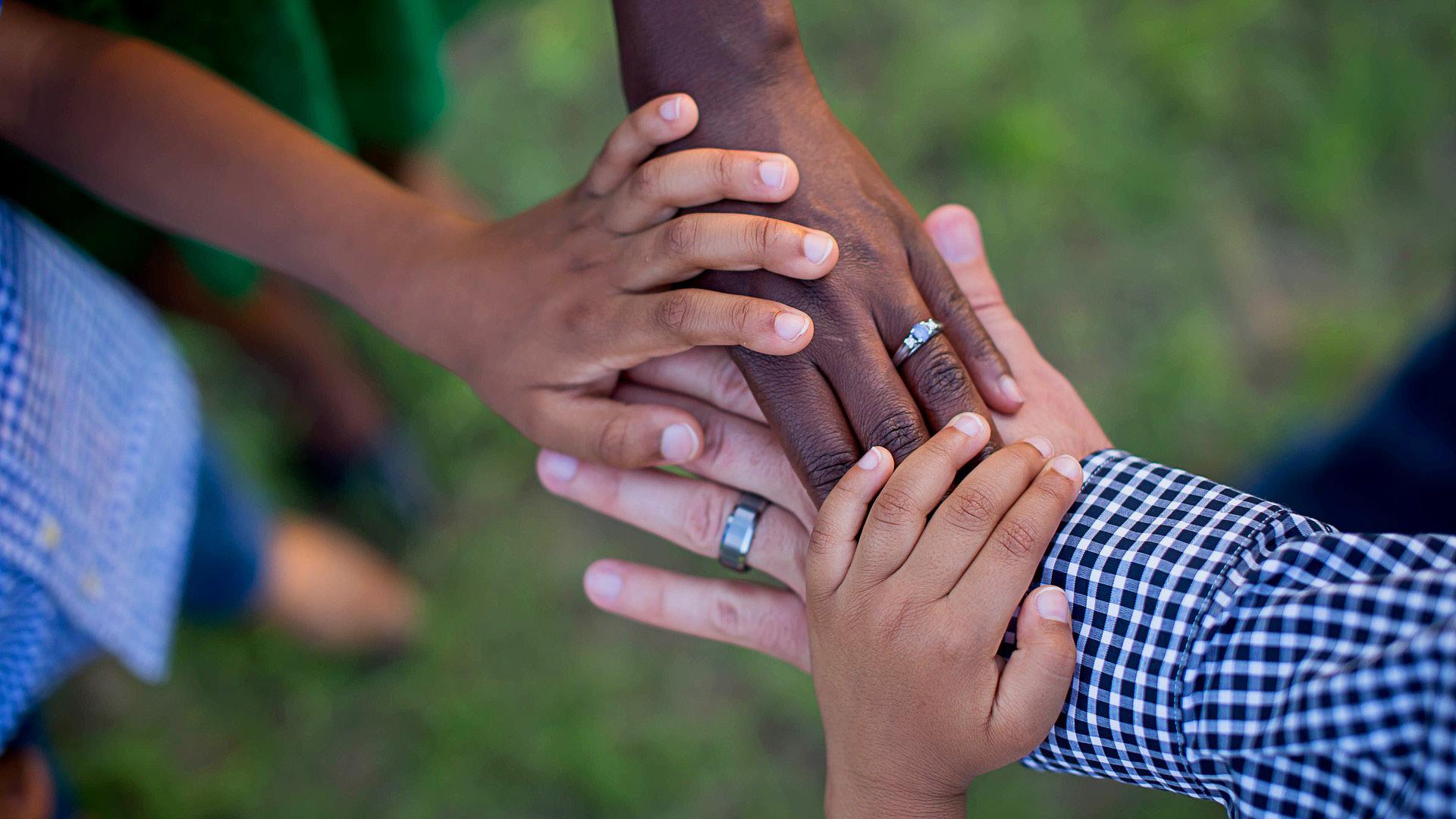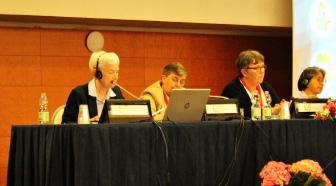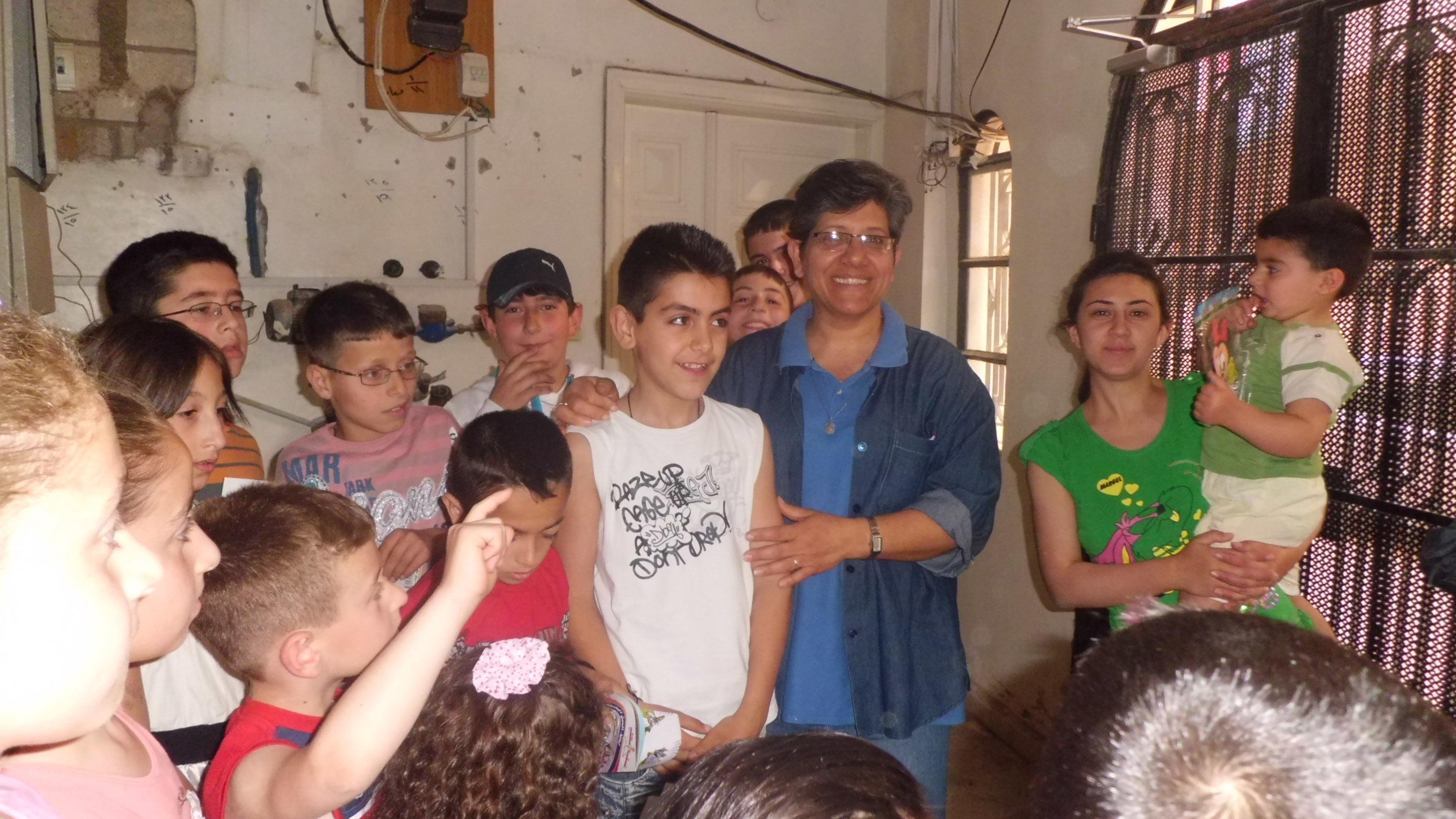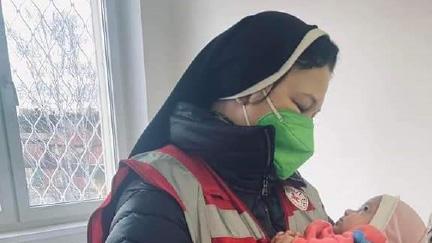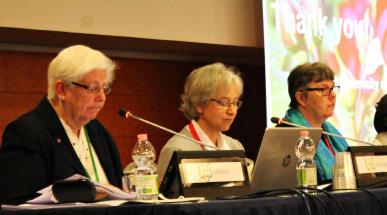
12 minute read
The Leader’s Vulnerability during the Pandemic
Sr. Mª Carmen Mora Sena, HCSA
Sr. Mª del Carmen Mora Sena, Superior General of the Sisters of Charity of Saint Anne, Vice President of the Health Commission of the USG-UISG, (native of Seville, Spain), has a degree in Medicine and Surgery from the University of Seville (1988) and is a Specialist in Family and Community Medicine. She obtained a Master’s Degree in Bioethics from the Catholic University of Valencia.
Advertisement
UISG - Bulletin n. 178, 2022 When I received the invitation to participate in this panel, I felt that I could not say no because precisely vulnerability has accompanied me throughout my life, and I think it is the word that best defines my personal experience in the performance of the service of Superior General of the Congregation of which I am part, the service I started in July 2019, just a few months before the beginning of the COVID-19 pandemic. The truth is that, from the very beginning, even before the pandemic started, I felt small and vulnerable and had practically spent the first year of this service wondering why I said Yes at the Chapter, upon being elected. I remembered Samuel asking Jesse, “Are these all the sons you have?” (1 Sam 16:11) I had some experience of Government, but I had never been a “Superior” in my life, not even in a local community… I could easily feel my limits in everyday life: a certain personal insecurity, attachment to my image, desire to “do well,” not knowing how to manage my emotions properly, nor expressing myself very well when affected by them…, and I felt that there were other Sisters who could render this service better than I could. However, during the Spiritual exercises that I experienced during the Pandemic, the “choice” was to “say yes” to the service that I now carry out, from the perspective of vulnerability, convinced that this is the type of leadership that religious life needs today. I am Spanish and, in my country, a “state of alarm” was declared in March 2020 because of the Pandemic. I had returned from Venezuela a week earlier—with accumulated fatigue
Sr. Mª Carmen Mora Sena, HCSA - The Leader’s Vulnerability During the Pandemic
UISG - Bulletin n. 178, 2022 and delayed issues waiting to be resolved—and was not aware of the situation, so the news surprised me. Beyond the initial recommendations, protocols, and guidelines for action that we sent, together with the Councilor in charge of Health, to communities and centers, I confess that it was difficult for me to react:
- on the one hand, I felt that I was “not coping enough,” that I lacked the time to look everywhere, that I missed important details, and that it was difficult for me not to be as generous, available, or creative as other Sisters... And I simply had to accept my reality with humility; - on the other hand, I needed to make arrangements with my family to care for my mother, who had Alzheimer’s and was totally dependent... It was hard for me not to be present, but I understood that it was better for her to be cared for by those who were closest to her, and I was grateful for the help of my siblings; - moreover, I felt insecure because I did not know what my role was, whether to offer myself as a doctor to take care of infected people, as some suggested, which would have meant putting at risk the many elderly sisters of the house where I live; or whether it would be better to keep my hand on the helm of the ship without knowing the course... Without much clarity, I chose the second option. After discussing the matter with my Sisters of Council, I wrote a circular letter to all the Sisters explaining what was known at that time about the COVID infection: I called for calm and responsibility, invited trust in God, and intense intercessory prayer, encouraged solidarity from the creativity of love—citing examples of what our Sisters were already doing in different places—, and I asked those who were not especially vulnerable to the virus or lived with people who were to offer themselves to their Provincial Superiors to care for those infected wherever necessary, to carry out tasks to support vulnerable people or to respond creatively to other needs being caused by the pandemic. We also opened communication channels to share, among Sisters, information related to the pandemic and to welcome prayer requests from those who wanted our prayerful support. Both were used extensively. The good news of solidarity actions carried out by our Sisters was soon followed by news of complex and difficult situations that were arising: - The contagion made its appearance in our communities and centers, mainly in the houses of elderly sisters, homes for the elderly and hospitals. Sisters, people we cared for, some workers… became ill and died from COVID. o In some large communities of elderly sisters, almost all the elderly and the caregivers were infected, and it was necessary to send reinforcements to take care of them; those sisters who were also infected, including one from my community of the General Council. Most of those who went to the hospital did not come back alive, and that made us fear their admission… Moreover, it was hard not being able to accompany them there—because that was not allowed—and they died alone… Some communities lost as many as nine Sisters to COVID in one month… At times, we were afraid to turn on the computer and find more obituaries of sisters who had died. Added to this were the repeated confinements within the houses that kept cognitively impaired sisters in their rooms because one or another had been found positive, and this made them sadder and decline faster.
Sr. Mª Carmen Mora Sena, HCSA - The Leader’s Vulnerability During the Pandemic
UISG - Bulletin n. 178, 2022 o In the homes for the elderly, it hurt a lot to lose some of those with whom we had lived so long; their relatives asked not to take them to the COVID centers because they felt greater trust in the sisters, even though the means were scarce at that time. There were infected sisters who continued to run the residence from their isolation, while others who, even when ill, continued to work caring for the infected… o Our own hospitals were put at the disposal of the authorities to treat COVID patients. This generated a great economic loss that led us to request credits that require the permission of Rome because of the amount (because the programmed surgical activity that could bring us income was suspended, and the expenses increased, since the patients were sent to us, but we did not receive material or protective equipment, nor support to acquire it); but, above all, it also meant contagion and death of young sisters who cared for the affected—the first of them, was one of my group.
o The sisters in educational centers adapted as best and fast as they could to virtual teaching; but, in many places, the students lacked the means to follow on-line classes, and they had to be creative and risk sending them pedagogical guides, while offering material and psychological support to them and their families…. Due to the lack of attendance, family relocations, and because parents lost their jobs, we lost students and, in some countries, we had to postpone the payment of part of the salaries of the workers because we were unable to pay them at the time… o Our presence in remote places with poor communications also caused us to lose very young sisters, one of whom had made perpetual profession just a year earlier. o The provincials, some of whom became ill with COVID, kept me informed about the situation, and there were some who did not want to let the sisters
Sr. Mª Carmen Mora Sena, HCSA - The Leader’s Vulnerability During the Pandemic
UISG - Bulletin n. 178, 2022 of their Province know, and so avoid alarming them more; however, they did ask for this information, and this meant that I had to make compromises in order to offer it.
- Some sisters unexpectedly found themselves confined outside their communities—with their families, in other communities, or in places where there was no community nearby, and it took them months to be able to return home; some remained alone for over a year in their community, thousands of kilometers away from other sisters… It was hard to search and not find how to resolve these situations. - Other Sisters lost fathers, mothers, brothers or several close relatives in a few days and could not accompany them, say goodbye to them, or attend their funeral…. I also lost my mother, but—in the midst of grief—precisely because of her dependency, it was easier for me to travel; I had the grace to accompany her and take care of her as a doctor at home during the days before her death, although I was affected - by the restrictions regarding burials, which did not allow close relatives such as my mother’s brothers nor the sisters of my community to accompany us in that difficult moment… - Confinement kept sisters obliged to join the houses of formation from doing so, Provincials from traveling to receive first vows or perpetual professions, and some temporary professed Sisters from renewing their vows as usual in their community, before their Superior; and, so, creative solutions had to be found. o The process of the redesigning and unification of the Latin American Provinces and Delegation and the Provincial chapters were also affected. In the first case, meetings that we wanted to be face-to-face were postponed up to five times because of border closures or contagions. Those with the weakest number of sisters were also those who suffered the most were, until we finally found the bimodal formula and safer places to meet, which allowed us to unblock and complete the process. o The Chapter of the Delegation of Africa had to be postponed twice: first for a trimester and then for another year. It was going to be their first Chapter of elections, and the Council that was leaving was asking us to “name” a new Government Team… I understood that it was more pedagogical for them to elect it in Chapter, but it was very difficult for me to communicate to them the decision of not granting them what they were asking for; I knew that I was asking a lot, particularly of the Delegate Superior and her Secretary. When I picked up the phone to tell them, I did not really know what I was going to say or how… and the Lord opened my ear to listen, to understand, and to say it, offering at the same time “green spaces” and unconditional support from my poverty… - Due to border closures, it was necessary to postpone several canonical visits in which certain delicate issues had to be addressed with sisters… And it had to be done by zoom or by telephone when there was no more time left. - When, at last, the vaccines arrived, although the majority received them with hope, we found some “negationist” sisters who did not want to receive them but did want to continue working—some in health services or with vulnerable people—and, in addition to trying to persuade them, (providing confirmed scientific information, resolving doubts, and offering authoritative testimonies, such as the
Pope’s call not only to vaccinate ourselves but also to generate confidence among the poorest so that they would also do so), we had to find a way to combine
Sr. Mª Carmen Mora Sena, HCSA - The Leader’s Vulnerability During the Pandemic
UISG - Bulletin n. 178, 2022 respect for each one’s freedom with the protection of vulnerable third parties and the safeguarding of the Congregation’s accountability to their families. It is true that, in many of these difficult circumstances, I easily felt pain, bewilderment, smallness, fragility, insecurity, helplessness, but, at the same time, I discovered that, deep down, we shared the fate of many and that we were, in fact, more fortunate because of the Congregation’s the support. Little by little, I trained myself to live with uncertainty and learned to accept not being able to have everything “under control”, to accept and support reality as it came, to leave myself in God’s hands, and to seek—relying on the enlightenment of others, especially the sisters of my Council—solutions that were sometimes prudent and sometimes more risky, but which had to be explored. At the same time, the awareness of my limitations, weaknesses, and shortcomings made me more human and broadened my capacity to share and understand the pains, insecurities, weaknesses, and frailties of my sisters and of others. In many situations of loneliness, illness, death, loss, I could only be close, reach out with a message or a call, offer my ear and heart to listen and welcome—more often virtually than in person, accompany by affection and prayer… But, what seemed small to me, was a great relief for many. I was also able to welcome the help and solidarity of others, and to be a channel for sharing it with others. I remember with emotion the many packages of masks and gloves that our sisters from China and Macao sent us in successive shipments, when it was almost impossible to obtain them in Spain and many other places. I also felt the need to acknowledge and thank others for their support and help, their involvement in the work of the sisters, and the lay personnel of our Centers… And, even without having control of the media, counting on the help of my sisters, on May 1st , through social networks, I sent them all a message of recognition for their effort and dedication, of gratitude, encouragement and stimulus. What I have experienced leads me to discover that vulnerability makes synodality possible because it makes it clear that we need to walk together and to count on the wealth, support, light, and contribution of others; and it strengthens my conviction that this is the path of leadership that Religious Life needs today, it is the one that brings us closer and opens us to others and lets God take the reins of our Congregations and of the service we offer to the world.
It is the same path that He chooses in His Incarnation and at Easter to approach us, heal our wounds, and send us to continue His mission, counting on His Presence and His encouragement.

